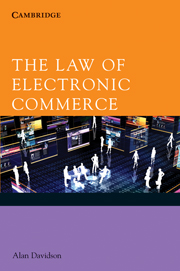Book contents
- Frontmatter
- Contents
- Acknowledgements
- Table of Cases
- Table of statutes
- 1 The law of electronic commerce
- 2 The rule of cyberspace
- 3 Electronic commerce and the law of contract
- 4 Shrinkwrap, clickwrap and browsewrap contracts
- 5 Electronic signatures
- 6 Copyright issues in electronic commerce
- 7 Electronic commerce – trade marks, patents and circuit layouts
- 8 Domain names
- 9 Domain name disputes
- 10 Uniform domain name dispute resolution policies
- 11 Jurisdiction in cyberspace
- 12 Defamation in cyberspace
- 13 Privacy and data protection in cyberspace
- 14 Electronic mail and online presence
- 15 National electronic surveillance
- 16 Cybercrime
- 17 Evidence of electronic records
- 18 Censorship – Broadcast and online content regulation
- 19 An international perspective
- Appendix A Electronic Transactions (Victoria) Act 2000
- Appendix B UNCITRAL Model Law on Electronic Commerce
- Appendix C Selected provisions Copyright Act 1968 (Cth)
- Appendix D ICANN Uniform Dispute Resolution Policy (UDRP)
- Appendix E .au Dispute Resolution Policy (auDRP)
- Appendix F National Privacy Principles
- Index
- References
6 - Copyright issues in electronic commerce
Published online by Cambridge University Press: 05 June 2012
- Frontmatter
- Contents
- Acknowledgements
- Table of Cases
- Table of statutes
- 1 The law of electronic commerce
- 2 The rule of cyberspace
- 3 Electronic commerce and the law of contract
- 4 Shrinkwrap, clickwrap and browsewrap contracts
- 5 Electronic signatures
- 6 Copyright issues in electronic commerce
- 7 Electronic commerce – trade marks, patents and circuit layouts
- 8 Domain names
- 9 Domain name disputes
- 10 Uniform domain name dispute resolution policies
- 11 Jurisdiction in cyberspace
- 12 Defamation in cyberspace
- 13 Privacy and data protection in cyberspace
- 14 Electronic mail and online presence
- 15 National electronic surveillance
- 16 Cybercrime
- 17 Evidence of electronic records
- 18 Censorship – Broadcast and online content regulation
- 19 An international perspective
- Appendix A Electronic Transactions (Victoria) Act 2000
- Appendix B UNCITRAL Model Law on Electronic Commerce
- Appendix C Selected provisions Copyright Act 1968 (Cth)
- Appendix D ICANN Uniform Dispute Resolution Policy (UDRP)
- Appendix E .au Dispute Resolution Policy (auDRP)
- Appendix F National Privacy Principles
- Index
- References
Summary
The internet facilitates the swift copying and exchange of digital material. Hyperlinking and framing can result in new and novel possibilities for infringement of copyright. Works protected by copyright, such as music and videos, can be easily transferred in peer-to-peer dealings. Such transfers have become the target of copyright owners. This chapter explores these issues and developments and the contiguity between copyright and electronic commerce. It is not intended to state the law relating to copyright, other than a brief overview. The advent of electronic commerce and the internet have necessitated a rethink of intellectual property issues by the World Intellectual Property Organisation (WIPO), the courts and the legislature. The proliferation of material on the internet – written, aural and graphic – has posed new questions and resulted in the creation of new rights internationally. The next chapter addresses the interplay between electronic commerce and intellectual property rights in trade marks, patents and circuit layouts.
The nature of copyright
Intellectual property comprises state-sanctioned rights entitling the holder of such rights to a limited monopoly on exploiting and controlling the property for a predetermined period of time. The state gains the benefit of, for example, literary and musical works, new inventions, medicines, research, designs and innovation. Inventors, writers, composers and designers have the incentive of potential rewards for their efforts. Their works, patents and designs will form part of the public domain when the predetermined period expires.
- Type
- Chapter
- Information
- The Law of Electronic Commerce , pp. 89 - 109Publisher: Cambridge University PressPrint publication year: 2009



